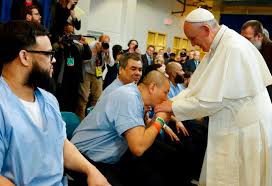This post is part of our series on Pope Francis’ interview in America magazine.
The other posts can be found here (Meghan Clark, Jason King, Ramon Luzarraga).
Pope Francis’ interview in American magazine, as well as his recent interview with Eugenio Scalfari, an avowed atheist and founder of the Italian media outlet La Repubblica, reads to me like lectio divina. I read a bit, I pause, I ponder the meaning of his words, I sense depth beyond the surface level, it affects me deeply – I even admit to having wept, I have been so touched. As I read I feel like I am sitting in his apartment along with him. Pope Francis’ words are – in a word – healing. Under the section, “The Church as Field Hospital,” he speaks of the need to heal wounds five times as one of the most important goals of the church today. He also speaks repeatedly of warming people’s hearts so that they may love more freely.
As a moral theologian I take it as a foundational principle that people are motivated to act more on what they love and desire as good than by what they fear (not that the latter can’t also be a powerful motivator, but ultimately love triumphs and is more foundational). This is actually a basic principle of action first articulated by Aristotle and developed in a theological context by Thomas Aquinas. Augustine also understood that people are defined by what they love as it sets the ultimate horizon for everything one desires, thinks, and does in life. Francis echoes this truth when he speaks of warming people’s hearts with the essentials of the gospel, or when he says that “we have to encourage people to move toward what they think is Good” (Scalfari interview). He is quite honest about his lessons as a Jesuit provincial, where he discovered early on that “eventually people get tired of authoritarianism.”
Francis is certainly cultivating a tone of openness and dialogue that we are not accustomed to from bureaucrats, but that we expect from pastors. After reading these interviews, I actually feel like I am sitting right there with him in his apartment, having a conversation with an old friend. Just the fact that he personally called and invited Scalfari, an avowed atheist and critic, to visit with him is an indication that he is taking the call of Vatican II to dialogue with those in the modern world seriously.
One cannot help but wonder what all of this means for the future of the church. I offer here two open questions that are raised by what he has said in this interviews. I will do my best to stick to what he says and not overlay my own interpretations, while also indicating what questions I think his comments raise.
Synodality/Collegiality
- These are two buzz-words from the ecclesiology of Vatican II. Synodality comes from two Greek terms – syn (meaning “with”) and hodos (meaning “way, path, or journey”). Synodality means something like ‘together with each other on the journey.’ This is also expressed through collegiality, a recognition that the college of bishops works together under the Pope as “head of the Church and the Diocese of Peter” (Scalfari interview). His creation of an advisory group of eight cardinals, and his comments about the Synod of Bishops (created by Paul VI after Vatican II) suggest that Francis may be interested in changing the structure of how the Synod functions in relation to the papacy. Under the heading “Experience with Church Governance” he says, “We must, however, give them [the consistories of cardinals and the Synod of Bishops] a less rigid form. I do not want token consultations, but real consultations.” What do “real consultations” look like? Only time and experience will tell what Francis has in store here.
The Role of Women in the Church
- His comments here have caused some controversy, which has only been exacerbated by the fact that America magazine inadvertently left out a sentence from the interview where Francis says, “‘It is necessary to broaden the opportunities for a stronger presence of women in the church.” And his comment that “we have to work harder to develop a profound theology of the woman” has been met by theologians such as Maureen Fiedler with a resounding “that’s what we’ve been doing for decades already.” Francis has also stated in the Scalfari interview that “We will also discuss the role of women in the Church. Remember that the Church (la chiesa) is feminine.” Are these hints that the Pope is planning to open a discussion about opening official channels of leadership in the church to women? Or is he just pointing out a grammatical truth that the Italian noun, la chiesa, is feminine? It’s hard to say, but it seems like he is raising this point for a reason. Again, only time will tell what Francis is planning.
I eagerly await the next opportunity I have to sit and drink coffee with the Pope in his apartment… In the meantime, happy feast of St. Francis to all!




